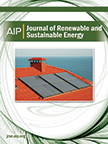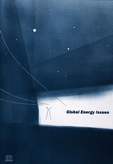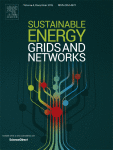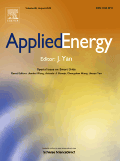
Global Energy Interconnection-China
Scope & Guideline
Transforming Energy Challenges into Innovative Solutions
Introduction
Aims and Scopes
- Integrated Energy Systems:
The journal emphasizes research on integrated energy systems that combine various energy sources, including renewables such as wind, solar, and hydrogen, to improve efficiency and sustainability. - Smart Grid and Cyber-Physical Systems:
It covers advancements in smart grid technologies and cyber-physical systems, focusing on enhancing the reliability, security, and efficiency of energy distribution and consumption. - Energy Storage and Management:
Research on energy storage solutions and management strategies is a core focus, addressing the challenges of fluctuating renewable energy supply and ensuring grid stability. - Carbon Emissions and Sustainability:
The journal explores methodologies for evaluating and reducing carbon emissions in energy systems, contributing to global sustainability goals. - Data-Driven Approaches and AI:
There is a strong emphasis on data-driven methodologies, including machine learning and AI, for optimizing energy system operations and predictive maintenance. - Policy and Economic Analysis:
The journal also engages in the policy and economic aspects of energy interconnection and sustainability, providing insights into market dynamics and regulatory frameworks.
Trending and Emerging
- Decentralized Energy Systems:
There is a growing emphasis on decentralized energy production and management systems, including microgrids and peer-to-peer energy trading, which enhance local energy resilience. - Advanced Energy Storage Technologies:
Research on advanced energy storage technologies, such as battery systems and hydrogen storage, is gaining traction as solutions to support renewable energy integration. - Cybersecurity in Energy Systems:
With the increasing digitization of energy systems, cybersecurity has become a critical focus, addressing vulnerabilities in smart grid infrastructures. - Integration of AI in Energy Management:
The application of artificial intelligence and machine learning for optimizing energy management, predictive maintenance, and operational efficiency is emerging as a significant theme. - Multi-Energy Coupling and Optimization:
Research on multi-energy coupling, where different energy carriers (electricity, heat, hydrogen) are integrated for optimized performance, is on the rise. - Climate Change Mitigation Strategies:
The journal is increasingly focusing on strategies for climate change mitigation, including carbon trading and sustainable energy policies.
Declining or Waning
- Conventional Energy Systems:
Research focused on traditional energy generation methods, such as coal and natural gas, has decreased as the emphasis shifts towards renewable energy and sustainability. - Simple Energy Forecasting Models:
There is a waning interest in basic energy forecasting models, with researchers moving towards more complex, data-driven approaches that incorporate machine learning and AI. - Static Grid Management Techniques:
Static approaches to grid management are becoming less common, as dynamic and adaptive strategies gain importance in the context of smart grids and real-time data utilization. - Basic Energy Efficiency Measures:
The focus on basic energy efficiency measures is diminishing, with more attention being given to comprehensive integrated strategies that encompass multiple energy sources and technologies.
Similar Journals

Journal of Modern Power Systems and Clean Energy
Pioneering Research for a Cleaner, Greener Future.Journal of Modern Power Systems and Clean Energy is a leading academic platform dedicated to advancing the fields of energy engineering, power technology, and renewable energy. Published by the prestigious STATE GRID ELECTRIC POWER RESEARCH INSTITUTE in China, this Open Access journal has been a significant contributor to the dialogue on sustainable energy solutions since its inception in 2013. With a Q1 ranking in both the Energy Engineering and Power Technology and Renewable Energy, Sustainability and the Environment categories, it serves a crucial role for researchers and professionals striving to push the boundaries of innovation in power systems and clean energy technologies. The journal’s impact is reflected in its impressive Scopus rankings, placing it in the top 10% of its categories, making it an invaluable resource for academia and industry alike. The Journal of Modern Power Systems and Clean Energy invites submission of original articles, reviews, and case studies that resonate with its mission of promoting sustainability and addressing contemporary energy challenges.

Journal of Renewable and Sustainable Energy
Pioneering Sustainable Solutions for a Greener FutureThe Journal of Renewable and Sustainable Energy, published by AIP Publishing, stands at the forefront of research in the fields of renewable energy and sustainable practices. With an ISSN of 1941-7012, this journal aims to foster innovative research and exchange of knowledge on sustainable technologies and methodologies that contribute to environmental conservation and energy efficiency. Achieving a prestigious Q2 ranking in the category of Renewable Energy, Sustainability, and the Environment, it ranks 135 out of 270 journals in Scopus, signifying its impactful contributions to the field. The journal, active from 2010 to 2024, provides a platform for authors, analysts, and practitioners to disseminate significant findings that can shape future environmental policies and energy frameworks. Although not currently an Open Access publication, it remains an essential resource for researchers dedicated to advancing sustainable development and energy solutions.

Smart Energy
Empowering Energy Innovation through Open Access ResearchSmart Energy, an esteemed publication by ELSEVIER, stands at the forefront of energy research, exploring innovative solutions and sustainability practices in the energy sector. With an impressive Open Access model since its inception in 2021, this journal has rapidly established itself as a vital resource for researchers and professionals alike, providing unrestricted access to high-quality peer-reviewed articles. Positioned in the Q1 category across multiple fields, including Energy Engineering and Power Technology, Renewable Energy, and Management, Monitoring, Policy and Law, Smart Energy demonstrates a strong commitment to advancing knowledge in the energy domain. Registered under the ISSN 2666-9552, it garners significant attention, ranking within the top ranges of Scopus metrics across various disciplines. The journal continuously aims to bridge the gap between academic research and practical application, making it an essential outlet for scholars and practitioners dedicated to fostering sustainable energy solutions worldwide. Located in the United Kingdom, Smart Energy is shaping the future of energy management from its publishing base in Amsterdam, the Netherlands.

Frontiers in Energy
Exploring the Future of Energy Through Groundbreaking Research.Frontiers in Energy is a distinguished journal published by HIGHER EDUCATION PRESS, focusing on the dynamic and rapidly evolving field of energy engineering and power technology. Established in 2011, the journal serves as a pivotal platform for disseminating innovative research findings and practical applications that address critical challenges in energy systems. With an impressive Q2 ranking in 2023 and a Scopus rank of 81 out of 272 in the discipline, it highlights the journal's influential impact within the academic community, reflecting its commitment to high-quality research. Based in Beijing, China, the journal aims to promote open and accessible scientific discussion, facilitating collaboration among researchers, professionals, and students alike. As an open access publication, Frontiers in Energy ensures that valuable knowledge is readily available to a global audience, effectively contributing to advancements in sustainable energy solutions. Join the forefront of energy innovation by engaging with cutting-edge research that shapes our energy future.

International Energy Journal
Advancing the Future of Energy ResearchInternational Energy Journal is a pivotal academic publication dedicated to advancing research and knowledge in the dynamic field of energy. Published by the REGIONAL ENERGY RESOURCES INFO CENTER in Thailand, this journal focuses on a broad spectrum of energy topics, including renewable sources, energy policy, and sustainable practices. With a recognized Q3 category ranking in the field of Energy (Miscellaneous) and a Scopus rank of #47 out of 73, it serves as a critical platform for researchers, professionals, and students eager to contribute to and stay abreast of the latest trends and developments in energy science. The journal, which has been in continuous publication since 2000, operates on an open-access basis, ensuring that its findings are accessible to a global audience. Researchers looking to publish their work in a well-respected journal with a growing impact factor will find the International Energy Journal to be an excellent choice for disseminating their studies and innovations in this essential field.

Problemele Energeticii Regionale
Transforming Energy Discourse through Open Access KnowledgeProblemele Energeticii Regionale is a notable academic journal focused on the field of energy engineering and sustainable energy solutions, published by the Institute of Power Engineering, Academy of Sciences of Moldova. Since its inception in 2005, this Open Access journal has become a significant platform for disseminating research and innovations in various energy-related domains, including renewable solutions, fuel technology, and energy sustainability. While its impact factor metrics suggest it currently resides in the Q4 quartile category across multiple scopes—such as Energy Engineering, Power Technology, and Renewable Energy—it provides critical insights that can pave the way for advancements in regional energy challenges. Researchers, professionals, and students alike will find this journal an essential resource for understanding and contributing to the ongoing discourse in the energy sector. With its commitment to accessibility and knowledge sharing, Problemele Energeticii Regionale aims to foster a collaborative and informed community focused on energy innovation and sustainability.

INTERNATIONAL JOURNAL OF GLOBAL ENERGY ISSUES
Uniting Voices in the Quest for Sustainable Energy SolutionsThe INTERNATIONAL JOURNAL OF GLOBAL ENERGY ISSUES, published by INDERSCIENCE ENTERPRISES LTD, stands as a vital platform for disseminating innovative research in the fields of energy engineering, nuclear energy, and renewable sustainability. With ISSN 0954-7118 and E-ISSN 1741-5128, this journal has been catering to the energy sector since 1989, advancing scholarly dialogue through critical analyses and discussions of emerging energy technologies and policies. Though currently categorized in the fourth quartile across various energy-related disciplines, the journal aims to bridge knowledge gaps and offer insights that challenge the status quo. Operating from its headquarters in the United Kingdom and accessible to a global audience, the journal encourages submissions that drive interdisciplinary research and provide solutions for pressing global energy challenges. Researchers, professionals, and students alike are invited to contribute and engage with this prestigious journal to influence the future of energy practices.

Sustainable Energy Grids & Networks
Elevating Knowledge in Energy Integration and TechnologySustainable Energy Grids & Networks, published by ELSEVIER, stands at the forefront of research in energy systems, contributing significantly to the fields of Control and Systems Engineering, Electrical and Electronic Engineering, and Energy Engineering and Power Technology. With an impressive impact factor, this journal is ranked in the top quartile (Q1) for key engineering categories, affirming its authority and influence within the academic community. The journal is dedicated to publishing high-quality research focused on the sustainable integration of energy systems and smart grid technology, which is crucial in addressing the pressing challenges of climate change and energy consumption. Although it operates on a subscription model, the rigorous peer-review process ensures that only the most innovative and impactful studies are disseminated, promoting advancements in renewable energy and sustainability. As a critical resource for researchers, professionals, and students, Sustainable Energy Grids & Networks provides a platform for the exchange of ideas that drive the future of sustainable energy solutions, fostering collaboration and knowledge-sharing across disciplines.

APPLIED ENERGY
Illuminating pathways to efficient energy practices.APPLIED ENERGY, published by Elsevier Science Ltd, is a leading journal dedicated to the advancing field of energy research, focusing on practical engineering solutions to contemporary challenges in energy management, sustainability, and environmental impact. With a rigorous peer-review process and a strong commitment to promoting innovative research, APPLIED ENERGY proudly holds multiple Q1 rankings across various categories, including Building and Construction, Civil and Structural Engineering, and Renewable Energy, reflecting its prestigious position within the academic community. Researchers and professionals can benefit from its comprehensive scope, covering topics that span from policy and technology to market dynamics. Although it is not an open-access journal, it provides access options that facilitate research dissemination. With its historical significance since 1975 and an ambitious outlook up to 2025, APPLIED ENERGY continues to be an essential resource for anyone looking to stay at the forefront of energy research and application.

Technology and Economics of Smart Grids and Sustainable Energy
Transforming Energy Economics through Cutting-edge Research.Technology and Economics of Smart Grids and Sustainable Energy, published by SPRINGERNATURE, is an esteemed open-access journal that has been critically influential in the interdisciplinary field of energy economics and smart grid technologies since its inception in 2016. Though the journal's coverage has been discontinued in Scopus, it has made considerable strides in providing a platform for innovative research and discussions on the socio-economic implications of sustainable energy systems. As it garners attention within the academic community, it proudly ranks in the 72nd percentile among Economics and Econometrics and showcases significant contributions in Renewable Energy and Sustainability. Researchers, professionals, and students will find this journal an invaluable resource for understanding the evolving technologies and economic frameworks that underpin the global shift towards smart grids and sustainable energy solutions. With the journal's focus on promoting knowledge dissemination, it stands at the forefront of educational advancement in this vital domain, embracing diverse perspectives and fostering collaboration across disciplines.